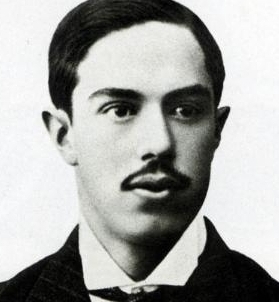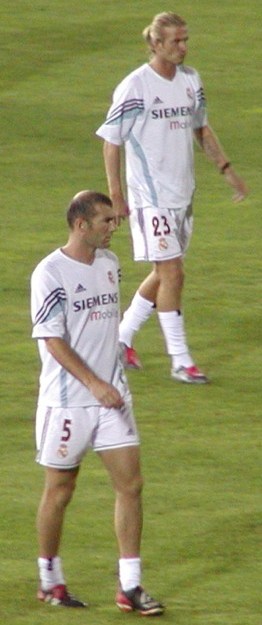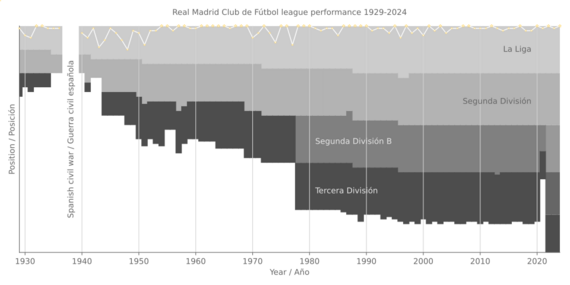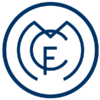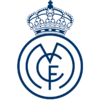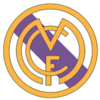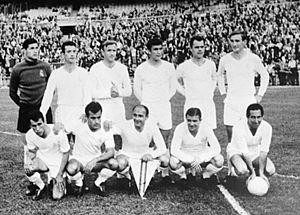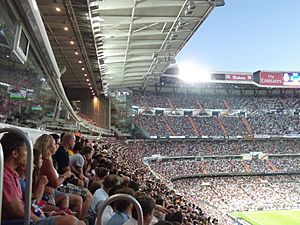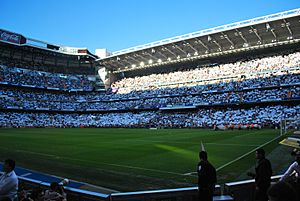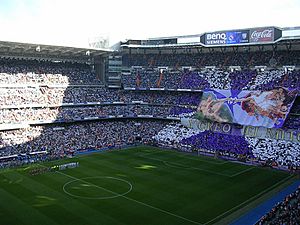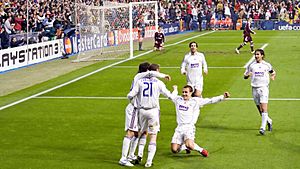Real Madrid CF facts for kids
 |
|||
| Full name | Real Madrid Club de Fútbol | ||
|---|---|---|---|
| Nickname(s) | Los Blancos (The Whites) Los Merengues (The Meringues) Los Vikingos (The Vikings) La Casa Blanca (The White House) Reyes de Europa (Kings of Europe) Madridistas (supporters) |
||
| Short name | RMA | ||
| Founded | 6 March 1902 (as Madrid Football Club) | ||
| Stadium | Estadio Santiago Bernabéu | ||
| Stadium capacity |
78,297 | ||
| Stadium coordinates |
40°27′11.0″N 3°41′18.1″W / 40.453056°N 3.688361°W | ||
| President | Florentino Pérez | ||
| Head coach | Xabi Alonso | ||
| League | La Liga | ||
| 2022–23 | La Liga, 2nd of 20 | ||
|
|
|||
Real Madrid Club de Fútbol, often called Real Madrid, is a famous professional football club from Madrid, Spain. They play in La Liga, which is the top football league in Spain.
The club started in 1902 as Madrid Football Club. Since then, their home uniform has always been white. The word 'Real' means "Royal" in Spanish. King Alfonso XIII gave the club this special title in 1920. He also added a crown to their club badge. Real Madrid has played their home games at the Santiago Bernabéu Stadium since 1947. This stadium can hold 78,297 fans. Unlike many other European sports clubs, Real Madrid has always been owned and run by its members, called socios. The club's official song is "Hala Madrid y nada más". Real Madrid is one of the most popular football clubs in the world. In 2024, it was valued at about $6.6 billion, making it the most valuable football club globally. It was also the first football club to earn €1 billion in revenue.
Real Madrid is one of the most successful football clubs in the world and in Europe. In Spain, they have won 71 trophies. This includes a record 36 La Liga titles, 20 Copa del Rey cups, and 13 Supercopa de España titles. Internationally, Real Madrid has won a record 35 trophies. They have won the European Cup/UEFA Champions League a record 15 times. They also have a record six UEFA Super Cups and nine World Champion titles. Real Madrid is ranked as the top club in Europe by UEFA and was named the "greatest football club of the 20th century" by FIFA.
Real Madrid is one of only three founding clubs of La Liga that have never been relegated from the top division since 1929. They have strong rivalries, especially with Barcelona (known as El Clásico) and Atlético Madrid (known as El Derbi Madrileño). In the 1950s and 60s, Real Madrid became a major power in football. They won the European Cup five times in a row and six times overall. They also won 12 league titles in 16 years. This team included legendary players like Alfredo Di Stéfano, Ferenc Puskás, and Paco Gento. Real Madrid is also famous for its Galácticos policy, where they signed the world's best players like Ronaldo, Zinedine Zidane, and David Beckham. In 2009, they signed Cristiano Ronaldo for a record fee. He became the club's all-time top goalscorer. More recently, Real Madrid has focused on signing young talents like Vinícius Júnior, Rodrygo, and Jude Bellingham.
Real Madrid holds the record for most appearances in the European Cup/UEFA Champions League (55 times). They also have the most wins, draws, and goals scored in the tournament. They are the only club to win three consecutive European Cup/Champions League titles twice. This happened first from 1956 to 1958, and then again from 2016 to 2018. In June 2024, they won their 15th Champions League title, which is a world record. Real Madrid is the first club from Europe's top five leagues to win 100 trophies in all competitions. As of July 2025, Real Madrid is ranked 1st in Europe by UEFA.
Contents
- Club History
- Club Crests and Colours
- Home Grounds
- Club Records and Statistics
- Club Support
- Club Rivalries
- Club Finances and Ownership
- Club Honours
- Club Players
- Club Personnel
- See also
Club History
Early Years (1902–1943)
Football came to Madrid thanks to students and teachers from the Institución Libre de Enseñanza. Some of them had studied at Cambridge and Oxford Universities. They started a club called (Sociedad) Sky Football in 1897. In 1900, some members left to form a new club, Nueva Sociedad de Football. This club was renamed Madrid Football Club in 1901.
On March 6, 1902, Madrid Football Club was officially founded. The founders wanted football to be a sport for everyone. They chose white as the team's color, inspired by a famous English team called Corinthian.
In 1905, just three years after being founded, Madrid FC won its first trophy, the Spanish Cup. The club helped create the Royal Spanish Football Federation in 1909. In 1920, King Alfonso XIII gave the club the title "Real" (Royal), and the club became Real Madrid.
The first Spanish football league started in 1929. Real Madrid almost won it but finished second. They won their first league title in the 1931–32 season and won it again the next year.
When the Second Spanish Republic began in 1931, the club lost its "Real" title and the crown on its badge. It went back to being Madrid Football Club until the end of the Spanish Civil War.
Santiago Bernabéu and Great Success (1943–1978)
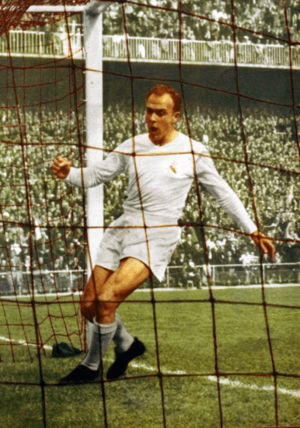
Santiago Bernabéu became president of Real Madrid in 1943. He helped rebuild the club after the Civil War. He also oversaw the building of the club's current stadium, the Santiago Bernabéu Stadium, and its training facilities. In the 1950s, he started signing world-class players from other countries, like Alfredo Di Stéfano.
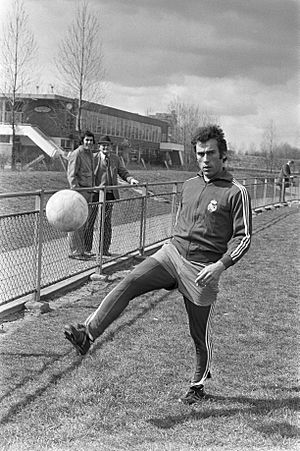
In 1955, Bernabéu helped create the European Cup, a tournament for top clubs in Europe. Under his leadership, Real Madrid became a major force. The club won the European Cup five times in a row from 1956 to 1960. This included a 7–3 win against Eintracht Frankfurt in the 1960 final. Because of these five wins, Real was given the original cup permanently. They also dominated in Spain, winning 12 league titles in 16 years.
The club won the European Cup for a sixth time in 1966. This team was called the "Yé-yé" team because all its players were from Spain. In the 1970s, Real Madrid won six league titles and three Spanish Cups. Santiago Bernabéu passed away in 1978 after being president for almost 35 years. During his time, the club won many major trophies.
Quinta del Buitre and Continued Success (1980–2000)
In the early 1980s, Real Madrid struggled to win the La Liga title. Then, a group of talented young players from the club's youth academy, called La Quinta del Buitre (meaning "The Vulture's Cohort"), changed things. This group included Emilio Butragueño, Manolo Sanchís, Martín Vázquez, Míchel, and Miguel Pardeza.
With these players, Real Madrid became one of the best teams in Spain and Europe in the late 1980s. They won two UEFA Cups and five Spanish championships in a row.
In 1996, Fabio Capello became coach. He brought in new players like Predrag Mijatović and Roberto Carlos. In 1998, Real Madrid won its seventh European Cup, ending a 32-year wait. They beat Juventus 1–0 in the final.
In 1999, Vicente del Bosque became coach. In the 1999–2000 season, Real won the Champions League for the eighth time. They beat Valencia 3–0 in the final. This win started a very successful period for the club.
Florentino Pérez Era (2000–2006)
In July 2000, Florentino Pérez became club president. He promised to clear the club's debt and sign the world's best players. This led to the "Galácticos" team, with global stars like Zinedine Zidane, Ronaldo, Luís Figo, and David Beckham joining the club every summer.
Even though they won the UEFA Champions League and Intercontinental Cup in 2002, and La Liga in 2003, the team didn't win another major trophy for the next three seasons. Off the field, the "Galácticos" policy made the club very successful financially, especially in Asia.
After winning La Liga in 2003, Pérez made some controversial decisions, like firing coach Vicente del Bosque. Many players left the club, including captain Fernando Hierro. The team struggled in the following seasons. In February 2006, Florentino Pérez resigned.
Ramón Calderón Era (2006–2009)
Ramón Calderón became president in July 2006. He brought back Fabio Capello as coach. Real Madrid won the La Liga title in 2007, their first in four years. However, Capello was still fired at the end of the season.
Real Madrid won the league again in 2007–08. But the next season was very difficult. They were knocked out of the Champions League early and lost badly to Barcelona 2–6 at home.
Second Florentino Pérez Era (2009–Present)

In June 2009, Florentino Pérez became president again. He continued the "Galácticos" policy. He bought Kaká for a record £56 million, and then broke that record by buying Cristiano Ronaldo for £80 million. Real Madrid spent over €261 million that summer.
The 2009–10 season was a rebuilding year. Madrid finished second in the league and were knocked out of the Champions League by Lyon. Cristiano Ronaldo scored 33 goals despite an injury.
José Mourinho became manager in May 2010. In the 2010–11 season, Madrid competed strongly against a very strong Barcelona team. They finished second in the league, won the Copa del Rey, and reached the Champions League semi-finals. Cristiano Ronaldo scored 40 goals and won the European Golden Shoe.
In the 2011–12 season, Real Madrid won La Liga for a record 32nd time. They set many league records, including 100 points and 121 goals scored. They reached the Champions League semi-finals again but lost to Bayern Munich in a penalty shootout. Cristiano Ronaldo became the fastest player to score 100 goals in the Spanish league.
Real Madrid started the 2012–13 season by winning the Supercopa de España against Barcelona. However, this was their only trophy that season. They finished second in La Liga and reached the Champions League semi-finals for the third year in a row. They also reached the Copa del Rey final but lost to Atlético Madrid. After the season, José Mourinho left the club.
La Décima and Champions League Dominance
On June 25, 2013, Carlo Ancelotti became the new manager. On September 1, 2013, Gareth Bale joined the club for a reported world record fee of €100 million. In Ancelotti's first season, Real Madrid won the Copa del Rey against Barcelona. The biggest success came in the UEFA Champions League. Real reached the final after twelve years and beat their city rivals Atlético Madrid 4–1 in extra time. This was their tenth European Cup, an achievement known as "La Décima" (The Tenth).
After winning the 2014 Champions League, Real Madrid signed players like Toni Kroos and James Rodríguez. In August, they won the 2014 UEFA Super Cup. However, they sold key players like Xabi Alonso and Ángel Di María, which caused some debate.
In the 2014–15 season, Real Madrid had a record-breaking 22-match winning streak. They also won their first Club World Cup. However, they finished second in La Liga and lost in the Champions League semi-finals. Carlo Ancelotti was dismissed in May 2015.
On June 3, 2015, Rafael Benítez became the new manager. His time was short, and he was replaced by Zinedine Zidane on January 4, 2016. Under Zidane, Madrid improved greatly. They won their eleventh Champions League title, "La Undécima", by beating Atlético Madrid in a penalty shootout in the final.
In the 2016–17 season, Zidane's first full season, Real Madrid won the 2016 UEFA Super Cup and the 2016 FIFA Club World Cup. They also set a new Spanish record of 40 matches unbeaten. In May, Madrid won their 33rd league title. On June 3, 2017, they beat Juventus in the Champions League final. This made them the first team to win two Champions League titles in a row. This was their 12th title, known as "La Duodécima". The 2016–17 season was their most successful in terms of trophies won.
Real Madrid continued their success in the 2017–18 season. They won their second consecutive UEFA Super Cup and their fourth FIFA Club World Cup. In the 2017–18 UEFA Champions League, they reached the final again and beat Liverpool 3–1. This made them the first club to win three Champions League titles in a row. On May 31, Zidane resigned as manager. Cristiano Ronaldo also left the club. This marked the end of a very successful period for Real Madrid.
After Ronaldo's Departure
In June 2018, Julen Lopetegui became the new manager. However, he was sacked in October after a poor start to the season, including a 1–5 loss to Barcelona. Santiago Solari took over but was also dismissed in March 2019. Zinedine Zidane then returned as head coach. Real Madrid finished the season with their lowest points total in many years.
In the summer of 2019, Madrid signed new players like Eden Hazard and Luka Jović. In January 2020, they won their eleventh Supercopa de España title. After a break due to the COVID-19 pandemic, La Liga restarted in June 2020. Madrid won ten games in a row to secure their 34th league title. During this time, and throughout the 2020–21 season, Real played home games at the Alfredo Di Stéfano Stadium while the Santiago Bernabéu was being renovated.
More Success and La Decimocuarta
Zidane left again in May 2021. Carlo Ancelotti returned to coach the team for the 2021–22 season. He led them to win La Liga and the Supercopa de España. In the Champions League, Madrid had an amazing run. They beat strong teams like Paris Saint-Germain, Chelsea, and Manchester City. They then faced Liverpool in the final. A goal from Vinícius Júnior secured Real's 14th European Cup, known as "La Decimocuarta".
Even More Success and La Decimoquinta
After a great 2021–22 season, Real Madrid signed Antonio Rüdiger and Aurélien Tchouaméni. Club legends like Marcelo and Casemiro left. The 2022–23 season started with winning the UEFA Super Cup and the FIFA Club World Cup. They also won the 2022–23 Copa del Rey, but finished second in La Liga and lost in the Champions League semi-finals.
In 2023, Real Madrid signed Jude Bellingham, who took the number 5 jersey. They also signed Arda Güler and Fran García. Vinícius Júnior was given the number 7 jersey, and Rodrygo the number 11. Karim Benzema left the club, and Toni Kroos announced he would retire after the season.
The 2023–24 season was very successful. Real Madrid won the Supercopa de España against Barcelona. They also won La Liga easily, earning 95 points. In the 2023–24 UEFA Champions League, they beat RB Leipzig and then defending champions Manchester City in a penalty shootout.
In the semi-finals, Real Madrid faced Bayern Munich. After a 2–2 draw in the first match, Real won the second match at the Bernabéu with two late goals from Joselu. In the final, they beat Borussia Dortmund 2–0. Dani Carvajal scored with a header, and Vinícius Júnior scored again in a Champions League final. Real Madrid won their 15th Champions League title without losing a single match in the tournament.
After the 2023–24 season, Real Madrid announced that star striker Kylian Mbappé would join the club in July 2024. On December 18, 2024, Real Madrid won their second trophy of the season, the first ever 2024 FIFA Intercontinental Cup, by beating Pachuca 3–0.
Club Crests and Colours
Club Crests
The first club crest was simple. It had the letters "MCF" for Madrid Club de Fútbol in dark blue on a white shirt. In 1908, the letters became smoother and were placed inside a circle.
In 1920, King Alfonso XIII gave the club the title "Real" (Royal). So, a crown was added to the crest, and the club became Real Madrid Club de Fútbol.
When the monarchy ended in 1931, the royal symbols were removed. The crown was replaced by a dark red band representing the region of Castile. In 1941, after the Civil War, the "Royal Crown" was put back on the crest. The Castile stripe stayed, and the crest became full color, mostly gold. The club went back to its name Real Madrid Club de Fútbol. The most recent change to the crest was in 2001. The red stripe was changed to a more bluish color.
Club Colours
Real Madrid has always worn a white shirt for its home games. There was one season in 1926 when they tried black shorts with the white shirt, inspired by an English team. But after losing badly, they went back to all-white, believing the other kit brought bad luck.
By the 1940s, buttons were added to the shirt, and the club's crest was placed on the left chest. In 1947, Real Madrid was the first Spanish team to wear numbered shirts.
Real's away colors are usually all blue or all purple. They have also used other colors like red, green, orange, and black. Their kits are made by Adidas, who have had a contract with the club since 1998.
Real Madrid's first shirt sponsor was Zanussi in the 1980s. Later sponsors included Parmalat, Otaysa, and Teka. From 2007 to 2013, bwin was their sponsor. Since 2013, Fly Emirates has been their main shirt sponsor. In 2024, HP Inc. became a sleeve sponsor.
Home Grounds
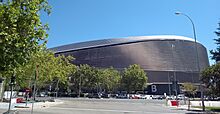 |
|
| Capacity | 85,000 |
|---|---|
| Field size | 107 m × 72 m (351 ft × 236 ft) |
| Construction | |
| Broke ground | 27 October 1944 |
| Opened | 14 December 1947 |
| Architect | Manuel Muñoz Monasterio, Luis Alemany Soler, Antonio Lamela |
Real Madrid has played at several stadiums. They moved to the Campo de O'Donnell in 1912, where they stayed for 11 years. Then they moved to the Estadio Chamartín in 1923. This stadium could hold 22,500 fans.
In 1943, president Santiago Bernabéu decided the Chamartín was too small. A new stadium was built and opened on December 14, 1947. It was first called Nuevo Chamartín, but was renamed in honor of Bernabéu in 1955.
The stadium's capacity has changed over time. It once held 120,000 people. Now, its official capacity is 81,044. Real Madrid has one of the highest average attendances in Europe.
The Bernabéu has hosted many important matches. These include the 1964 UEFA European Championship final, the 1982 FIFA World Cup final, and several European Cup/Champions League finals. The stadium has its own Metro station. In 2007, UEFA gave the Bernabéu "Elite Football Stadium" status.
On May 9, 2006, the Alfredo Di Stéfano Stadium was opened. It is named after club legend Alfredo Di Stéfano. This stadium is part of the Ciudad Real Madrid, the club's training facility. It has a capacity of 5,000 people and is the home ground for Real Madrid Castilla, the club's reserve team. During the COVID-19 pandemic and renovations at the Bernabéu, the first team played their home games here.
The Santiago Bernabéu is currently being renovated. The plan is to increase its capacity to nearly 85,000. It will also get a retractable roof, a retractable pitch, and a 360-degree screen. The renovations started in 2019 and are expected to be finished in 2023.
Club Records and Statistics

Raúl holds the record for most appearances for Real Madrid, with 741 games from 1994 to 2010. Iker Casillas is second with 725 games. The goalkeeper record is also held by Iker Casillas. Cristiano Ronaldo has scored the most international goals for the club, with 63.

Cristiano Ronaldo (2009–2018) is Real Madrid's all-time top goalscorer, with 450 goals in 438 matches. Six other players have scored over 200 goals for the club: Alfredo Di Stéfano, Santillana, Ferenc Puskás, Hugo Sánchez, Karim Benzema, and Raúl. Cristiano Ronaldo also holds the record for most league goals in one season (48 in 2014–15). He is also Real's top goalscorer in La Liga history with 311 goals. The fastest goal in club history was scored by Iván Zamorano in 13 seconds in 1994.
The highest attendance for a Real Madrid match was 129,690 in 1956. The current official capacity of the Santiago Bernabéu is 80,000. Real Madrid holds records in Spanish football, including the most domestic titles (36 as of 2024) and the most consecutive seasons won (five, twice). They also hold the record for the longest unbeaten run at home in La Liga, with 121 matches.
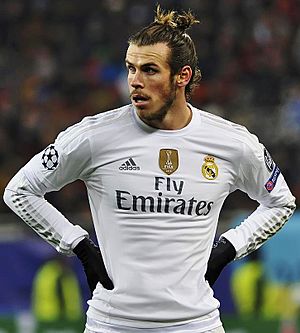
The club holds the record for winning the European Cup/UEFA Champions League 15 times. They also have the most semi-final appearances (33). As of June 2024, Cristiano Ronaldo is the all-time top scorer in the UEFA Champions League. The team has the record for most consecutive appearances in the European Cup (15 times). Real Madrid also had a 22-game winning streak in all competitions during the 2014–15 season, which is a Spanish record.
In June 2009, the club broke the record for the highest transfer fee ever paid in football history by buying Cristiano Ronaldo for €94 million. Before that, the record was for Zinedine Zidane's transfer in 2001. The transfer of Gareth Bale in 2013 was also a world record at around €100 million. Real Madrid equaled their record signing in 2019 when they signed Eden Hazard for €115 million. The club's record sale happened in 2018 when Juventus signed Cristiano Ronaldo for €117 million.
Club Support
Most seats at home matches are taken by season-ticket holders, limited to 65,000. To get a season ticket, you must be a socio, or club member. Real Madrid also has over 1,800 official fan groups, called peñas, around the world. Real Madrid regularly attracts over 74,000 fans to the Bernabéu. They were the first sports team to reach 100 million fans on Facebook in 2017.
Real Madrid's most dedicated fans are called Ultras Sur. They are known for their strong political views. The club president, Florentino Pérez, banned the Ultras from the Bernabéu to improve the atmosphere.
Club Rivalries
El Clásico
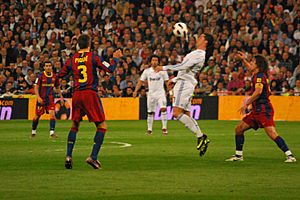
The rivalry between Real Madrid and Barcelona is known as "The Classic" (El Clásico). This rivalry is very intense because the clubs represent two different regions in Spain: Castile and Catalonia. Many see it as a reflection of political and cultural tensions. As of June 2025, Real Madrid has won 105 matches, Barcelona has won 104, and there have been 52 draws.
Barcelona has long been a symbol of Catalan identity, often seen as opposing the central government in Madrid. During the dictatorships in Spain, regional languages and identities were suppressed. Barcelona gained its motto Més que un club (More than a club) because of its connection to Catalan nationalism.
There is debate about how much the Franco regime (1939–75) influenced both clubs. Most historians agree that Franco did not have a favorite team at first. However, he later realized how important Real Madrid was for Spain's image around the world. Real Madrid became his preferred team.
The rivalry grew stronger in the 1950s when both clubs wanted to sign Alfredo Di Stéfano. He eventually joined Real Madrid and became a key player in their success. With him, Madrid won the first five European Cups.
In the 1960s, Real Madrid and Barcelona met in the European Cup. In the 1970s, Johan Cruyff joined Barcelona and became a hero to their fans. He said he chose Barcelona because he didn't want to play for a club linked to Franco.
El Clásico matches are known for their intensity and memorable goal celebrations. Players often mock the opposing fans. For example, Raúl once silenced Barcelona fans by putting a finger to his lips. Cristiano Ronaldo also told Barcelona fans to "calm down" after scoring.
El Derbi Madrileño
Real Madrid's closest rival is Atlético Madrid. Atlético was founded by Basque students in 1903 and later joined by former members of Madrid FC. Their first league meeting was in 1929, with Real winning 2–1.
After the Civil War, Atlético was linked with the military air force. During this time, Atlético became very successful. However, in the 1950s, the regime's preference shifted to Real Madrid. Atlético fans often chanted that Real was "The team of the government, the shame of the country." Atlético fans are sometimes called "Indios" (Indians) by Real Madrid fans.
The rivalry became international in 1959 when they met in the European Cup semi-finals. Real Madrid won. Atlético got some revenge by winning two Spanish Cup finals against Real in the early 1960s.
Between 1961 and 1989, Real Madrid dominated La Liga, but Atlético was their main challenger. Real Madrid has generally had a better record against Atlético in recent times. In 2013, Atlético won the Copa del Rey final against Real. In 2013–14, Real and Atlético met in the UEFA Champions League final, the first time two clubs from the same city played in the final. Real Madrid won 4–1 in extra time. They met again in the 2016 Champions League final, with Real winning after a penalty shootout.
European Rivalries
Bayern Munich
Real Madrid and Bayern Munich are two of the most successful clubs in the Champions League. They have played each other 26 times, more than any other two teams in the competition. Real Madrid fans sometimes call Bayern the "Bestia negra" ("Black Beast").
They met in the Champions League semi-finals in 2012, 2014, 2018, and 2024. Real Madrid won in 2014, 2018, and 2024, going on to win the competition each time.
Juventus
Another frequent European rival is Juventus, the most successful Italian club. They have played 21 matches against each other, with a very close record.
Their first meeting was in the 1962 European Cup. In the 1998 UEFA Champions League Final, Real Madrid beat Juventus 1–0. They met again in the 2002–03 UEFA Champions League semi-finals, with Juventus winning. By then, star player Zinedine Zidane had moved from Juventus to Real Madrid.
They faced each other in the 2017 UEFA Champions League Final in Cardiff, where Real Madrid won 4–1. Their latest Champions League meeting was in the 2017–18 quarter-finals. Real Madrid won, but the match was very dramatic. Cristiano Ronaldo scored a spectacular overhead kick in that tie.
Club Finances and Ownership
Under Florentino Pérez's first presidency (2000–2006), Real Madrid aimed to become the richest football club. The club sold some of its training grounds, which helped clear its debts. This allowed them to buy expensive players like Zinedine Zidane and David Beckham.
The sale of the training ground helped Real Madrid get rid of €270 million in debt. This money was also used to build a new training complex. Pérez's strategy helped the club earn a lot of money, especially from marketing the Real Madrid brand worldwide.
By 2007, Real Madrid was considered the most valuable football brand in Europe. In 2010, they had the highest income in football worldwide. A study at Harvard University said Real Madrid is one of the 20 most important brand names globally.
Real Madrid is owned by its supporters, who elect the president. The president cannot invest their own money. The club can only spend what it earns from sponsorships, merchandise, TV rights, prize money, and ticket sales. You cannot buy shares in the club, only a membership. As of 2010, the club had 60,000 members.
In the 2009–10 season, Real Madrid earned €150 million from ticket sales, the most of any club. They also sell around 1.5 million shirts each season. In 2013, Forbes magazine listed Real Madrid as the world's most valuable sports team, worth $3.3 billion. In 2022, Forbes again listed Real Madrid as the most valuable football club in the world, at $5.1 billion.
Club Honours
| Type | Competition | Titles | Seasons |
|---|---|---|---|
| Domestic | La Liga | 36 | 1931–32, 1932–33, 1953–54, 1954–55, 1956–57, 1957–58, 1960–61, 1961–62, 1962–63, 1963–64, 1964–65, 1966–67, 1967–68, 1968–69, 1971–72, 1974–75, 1975–76, 1977–78, 1978–79, 1979–80, 1985–86, 1986–87, 1987–88, 1988–89, 1989–90, 1994–95, 1996–97, 2000–01, 2002–03, 2006–07, 2007–08, 2011–12, 2016–17, 2019–20, 2021–22, 2023–24 |
| Copa del Rey | 20 | 1905, 1906, 1907, 1908, 1917, 1934, 1936, 1946, 1947, 1961–62, 1969–70, 1973–74, 1974–75, 1979–80, 1981–82, 1988–89, 1992–93, 2010–11, 2013–14, 2022–23 | |
| Copa de la Liga | 1 | 1985 | |
| Supercopa de España | 13 | 1988, 1989, 1990, 1993, 1997, 2001, 2003, 2008, 2012, 2017, 2020, 2022, 2024 | |
| Copa Eva Duarte | 1 | 1947 | |
| Continental | European Cup/UEFA Champions League | 15 | 1955–56, 1956–57, 1957–58, 1958–59, 1959–60, 1965–66, 1997–98, 1999–2000, 2001–02, 2013–14, 2015–16, 2016–17, 2017–18, 2021–22, 2023–24 |
| UEFA Cup/UEFA Europa League | 2 | 1984–85, 1985–86 | |
| UEFA Super Cup | 6 | 2002, 2014, 2016, 2017, 2022, 2024 | |
| Latin Cup | 2s | 1955, 1957 | |
| Worldwide | FIFA Club World Cup | 5 | 2014, 2016, 2017, 2018, 2022 |
| Intercontinental Cup | 3s | 1960, 1998, 2002 | |
| FIFA Intercontinental Cup | 1 | 2024 | |
| Ibero-American Cup | 1 | 1994 | |
| Regional | Campeonato de Madrid/Campeonato Regional Centro | 23 | 1903, 1905, 1905–06, 1906–07, 1907–08, 1912–13, 1915–16, 1916–17, 1917–18, 1919–20, 1921–22, 1922–23, 1923–24, 1925–26, 1926–27, 1928–29, 1929–30, 1930–31, 1931–32, 1932–33, 1933–34, 1934–35, 1935–36 |
| Copa Federación Centro | 4s | 1923, 1928, 1943, 1945 |
- record
- s shared record
Club Players
Spanish teams can have only three players who are not from the EU. The list below shows each player's main nationality. Some non-European players also have dual citizenship with an EU country.
Current Squad
|
|
Other Players Under Contract
|
|
Club Personnel
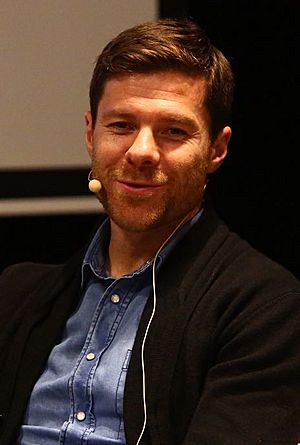
Current Technical Staff
| Position | Staff |
|---|---|
| Head coach | |
| Assistant coach | |
| Assistant technical & fitness coach | |
| Performance manager | |
| Technical assistant coach | |
| Technical analyst | |
| Goalkeeping coach | |
| Recovery specialist |
- Last updated: June 1, 2025
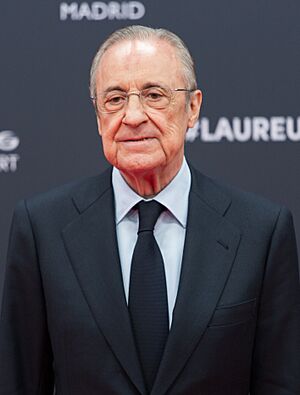
Management Team
| Position | Staff |
|---|---|
| President | Florentino Pérez |
| Vice-presidents | Fernando Fernández Tapias |
| Eduardo Fernández de Blas | |
| Pedro López Jiménez | |
| Honorary President | José Martínez Sánchez - Pirri |
| Secretary of the Board | Enrique Sánchez González |
| Members | Ángel Luis Heras Aguado Santiago Aguadi García Jerónimo Farré Muncharaz Enrique Pérez Rodriguez Manuel Cerezo Velázquez José Sánchez Bernal Gumersindo Santamaría Gil Raúl Ronda Ortiz José Manuel Otero Lastre Nicolás Martín-Sanz García Catalina Miñarro Brugarolas Manuel Torres Gómez |
- Last updated: June 4, 2024
See also
 In Spanish: Real Madrid Club de Fútbol para niños
In Spanish: Real Madrid Club de Fútbol para niños
- European Club Association
- List of fan-owned sports teams
- List of world champion football clubs
 | Charles R. Drew |
 | Benjamin Banneker |
 | Jane C. Wright |
 | Roger Arliner Young |


